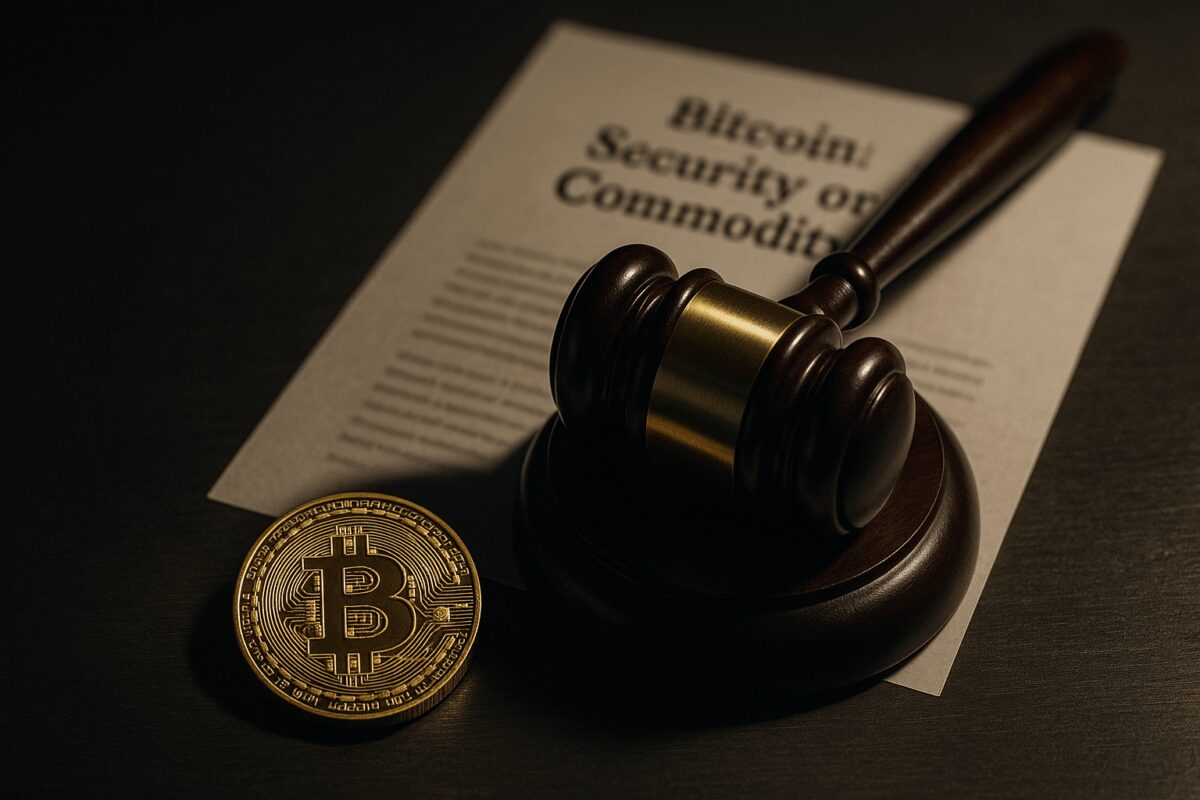
One question keeps echoing throughout the crypto world, and it’s not quieting down: is Bitcoin a security, or something entirely different? Finding the answer is tricky, with no straightforward “yes” or “no,” yet it holds significant financial weight for anyone invested, the exchanges trading it, and the whole structure of the digital money market. Even though American regulators like the SEC and CFTC have provided some direction on Bitcoin, internationally, it’s like looking at a scattered puzzle of ever-changing rules and how they’re understood.
The Howey Test: America’s Main Yardstick
Here in the U.S., the ultimate standard for what makes something a security comes from a 1946 Supreme Court case, SEC v. W.J. Howey Co., which gave us the Howey Test. This framework uses four specific criteria to determine if an asset should be treated as an “investment contract” and, therefore, a security. To earn the security label, an asset needs to show these characteristics:
- People invest money into it: For Bitcoin, this is pretty obvious since both individuals and big companies put their capital into it.
- The investment is in a shared endeavor: This suggests investors are pooling their money, with their financial outcomes linked.
- There’s an expectation of making a profit: It’s undeniable that most people buying Bitcoin hope its value will increase.
- Profits are expected mainly because of what other people do: This particular point is where intense debate sparks up regarding Bitcoin’s classification.
An asset only gets called a security if it meets all four of these conditions.
Bitcoin Meets Howey: Where Things Get Complicated
When you examine Bitcoin using the Howey criteria, its decentralized nature creates some interesting friction.
- Investing Money & Hoping for Profit: Almost everyone agrees Bitcoin checks these boxes. People use regular money or other assets to acquire Bitcoin, largely banking on its price to go up.
- Shared Endeavor: This is where the water muddies. Bitcoin, created by the mysterious Satoshi Nakamoto, runs on a network spread out globally. No single company runs it; there’s no CEO to point to. Such a decentralized setup doesn’t neatly fit the usual picture of a “common enterprise” where everyone’s investment success depends on one organization. The SEC itself has suggested that Bitcoin’s lack of a central controlling group means investors aren’t really pooling money into a “joint enterprise” in the typical way.
- Work of Others: This requirement is perhaps Bitcoin’s best argument against being labeled a security. A vast, worldwide network of miners and node operators keeps the system running. These participants earn rewards from the network itself (new Bitcoin and transaction fees), not because a management team is working to increase shareholder profits. High-ranking SEC officials, including past Chairman Jay Clayton and current Chair Gary Gensler, have stated that Bitcoin itself isn’t a security mainly because its value doesn’t hinge on the business or management efforts of a specific third party. William Hinman, who used to be the Director of the SEC’s Division of Corporation Finance, once famously remarked that if a network becomes “decentralized enough,” its asset might stop being an investment contract.
The Regulatory Decision: Bitcoin is a Commodity in America
The general consensus among U.S. regulators is that Bitcoin is not a security.
- The SEC’s View: Key figures at the SEC have repeatedly highlighted Bitcoin’s decentralized design as the primary reason it doesn’t conform to the security definition. Their logic is that people buying Bitcoin today aren’t counting on the crucial work of a promoter or a distinct group to make money.
- The CFTC’s Label: Adding to this, the CFTC has clearly identified Bitcoin as a commodity since back in 2015. This designation allows the CFTC to oversee Bitcoin futures and options and to combat fraud and manipulation in the direct buying and selling market. U.S. courts have upheld this view.
It’s vital to grasp that this approach generally covers Bitcoin itself. Financial products that are based on Bitcoin, or other digital assets, especially those introduced through Initial Coin Offerings (ICOs) with a central team promising future work, frequently find themselves targeted by the SEC as securities. Every digital asset needs its own careful, individual review.
Global Rulemakers: A Jigsaw of Bitcoin Classifications
Once you look outside the United States, how Bitcoin is regulated becomes a far more varied landscape.
- European Union: The EU’s Markets in Crypto-Assets (MiCA) regulation presents a thorough system, categorizing Bitcoin as a unique “crypto-asset.” MiCA strives to create consistency across its member countries, emphasizing protecting consumers, maintaining market fairness, and ensuring financial stability, all without trying to shoehorn Bitcoin into an old “security” or “commodity” definition. ESMA, the EU’s securities authority, stresses an approach that is neutral to technology and looks at the actual substance of an asset.
- United Kingdom: In the UK, the Financial Conduct Authority (FCA) regards “qualifying cryptoassets,” Bitcoin included, as a form of ‘Restricted Mass Market Investment’ when it comes to how they can be advertised. The FCA also evaluates cryptoassets by what they do – if one behaves like a conventional financial tool, it gets regulated that way.
- Canada: Regulating securities falls to the individual provinces and territories. The term “security” is defined broadly, and Canadian courts might consider the real nature of a deal, sometimes taking cues from U.S. ideas like the Howey Test. The main goals are always to protect investors and keep markets fair.
- Australia: The Corporations Act 2001 offers a wide definition for “securities,” which can cover shares in managed investment schemes. Different parts of the Act have specific definitions, all designed to broadly regulate financial products.
- Hong Kong: The Securities and Futures Ordinance (SFO) defines securities as things like shares, debentures, and shares in collective investment plans. Bitcoin by itself isn’t usually considered a security, but activities connected to it might be.
- Singapore: The Securities and Futures Act (SFA) lists shares and debentures as securities. Bitcoin, if not set up as part of such an instrument, is generally seen as something else, more like a digital way to make payments.
This variety points to a worldwide difficulty: making regulations work together smoothly to stop people from exploiting loopholes and to make sure everyone plays by the same rules.
The “Decentralized Enough” Test
The idea of “sufficient decentralization,” while not officially spelled out, has become a key discussion point for regulators, especially in the U.S. It implies that once a crypto network no longer depends on a central team for its core functions and success, the asset it supports is less apt to be called a security. Bitcoin is frequently held up as the best example of a network that is decentralized enough.
Proposed laws, such as the “Financial Innovation and Technology for the 21st Century Act” (FIT21) in the U.S., are trying to formally define how to measure decentralization, which could determine if an asset is regulated by the SEC or the CFTC.
What if Bitcoin Became a Security? The Ripple Effect
Consider for a moment if a major economic power like the U.S. decided to reclassify Bitcoin as a security; the fallout would be immense:
- Exchanges: Platforms that list Bitcoin would probably have to register as national securities exchanges, bringing on a massive load of compliance work and expenses. Trading could freeze, and platforms not meeting the new rules would likely have to remove Bitcoin.
- Investors: The market would become incredibly unstable. How Bitcoin is taxed could change significantly, and ordinary, non-professional investors might find their access cut off.
- Miners & Developers: While the basic work of miners might not be directly affected, the overall strength of the Bitcoin ecosystem could weaken. Developers could find it harder to innovate because of heavier regulations and potential legal dangers.
- Wider Crypto Market: Such a huge change for the leading cryptocurrency would send shockwaves of uncertainty everywhere, possibly causing a domino effect on other digital currencies.
Still, it’s important to remember that the general feeling among U.S. regulators leans away from this outcome for Bitcoin itself.
Bitcoin’s Journey as a Non-Security: What it Means for the Market
Bitcoin continuing to be treated mainly as a commodity, not a security, carries important results:
- Wider Acceptance: This classification generally makes it easier for both everyday people and large institutions to invest. The U.S. green-lighting spot Bitcoin ETPs (Exchange Traded Products) happened specifically because Bitcoin is seen as a non-security commodity, a development anticipated to draw millions more people into the market.
- Regulatory Structure: The CFTC will probably maintain its watch over Bitcoin derivatives and manipulation in the direct sales market. Tax agencies like the IRS consider Bitcoin property, meaning transactions can lead to capital gains or losses. Anti-money laundering and know-your-customer rules stay crucial for all businesses involved.
- Blending with Traditional Finance: Its non-security status helps Bitcoin merge more smoothly (though this is still a work in progress) with established financial systems. Bitcoin ETPs are a clear illustration, and more new financial products could be on the way.
The Bitcoin Difference: How It’s Not Like Other Cryptos
How regulators treat Bitcoin often differs sharply from how they view many other digital assets.
- Ether (ETH): Although the CFTC also considers Ether a commodity, its journey has been a bit more complex. Recent events, like the go-ahead for spot Ether ETFs and news that the SEC is dropping investigations into “Ethereum 2.0,” strongly point to its commodity status becoming more solid.
- XRP & ICO Tokens: The SEC has taken strong action against tokens it believes are unregistered securities. The Ripple (XRP) lawsuit, even though recently resolved, made this clear, with a court deciding that some direct sales of XRP to institutions were indeed securities offerings. Many tokens sold through ICOs, with promises of profit tied to a promoter’s work, are directly in the SEC’s sights.
- Other Altcoins: Cryptocurrencies such as Cardano (ADA) and Solana (SOL) have also been accused by the SEC of being securities in different legal actions.
Important factors that shape how regulators view these assets include how decentralized they are, how they were first distributed (ICOs raise red flags for the SEC), and how much they depend on a central organization for ongoing development and profit-making.
Lessons from History: New Ideas, Old Rules?
Financial history is full of instances where new types of instruments have tested existing regulatory systems. From the earliest private bank notes to intricate derivatives like asset-backed securities, regulators have consistently had to adapt. These past situations highlight how financial regulation evolves, the importance of looking at substance rather than just form, and the constant effort to protect investors. Bitcoin, while distinct, is just the latest chapter in this ongoing story.
The Path Ahead: Seeking Detail and Global Agreement
Globally, there’s a shift away from a simple “security or commodity” choice towards more detailed, custom-fit regulatory systems for digital assets. The EU’s MiCA is a prime illustration, establishing a separate category for “crypto-assets.” In the U.S., proposed laws like FIT21 look to draw clear lines for the SEC and CFTC’s responsibilities and might even introduce new labels like “digital commodity.”
The growing focus is on “same activity, same risk, same regulation,” concentrating on what crypto-related businesses actually do. International groups like the Financial Stability Board (FSB) and the Financial Action Task Force (FATF) are advocating for worldwide standards to create consistency and stop illegal activities.
In the end, even though Bitcoin’s decentralized setup has largely kept it from being labeled a security in important places like the U.S., the regulatory tale is certainly not finished. For anyone investing, keeping up with these developing global shifts isn’t just a good idea – it’s vital for successfully navigating the exciting, and often unpredictable, world of the crypto market.




